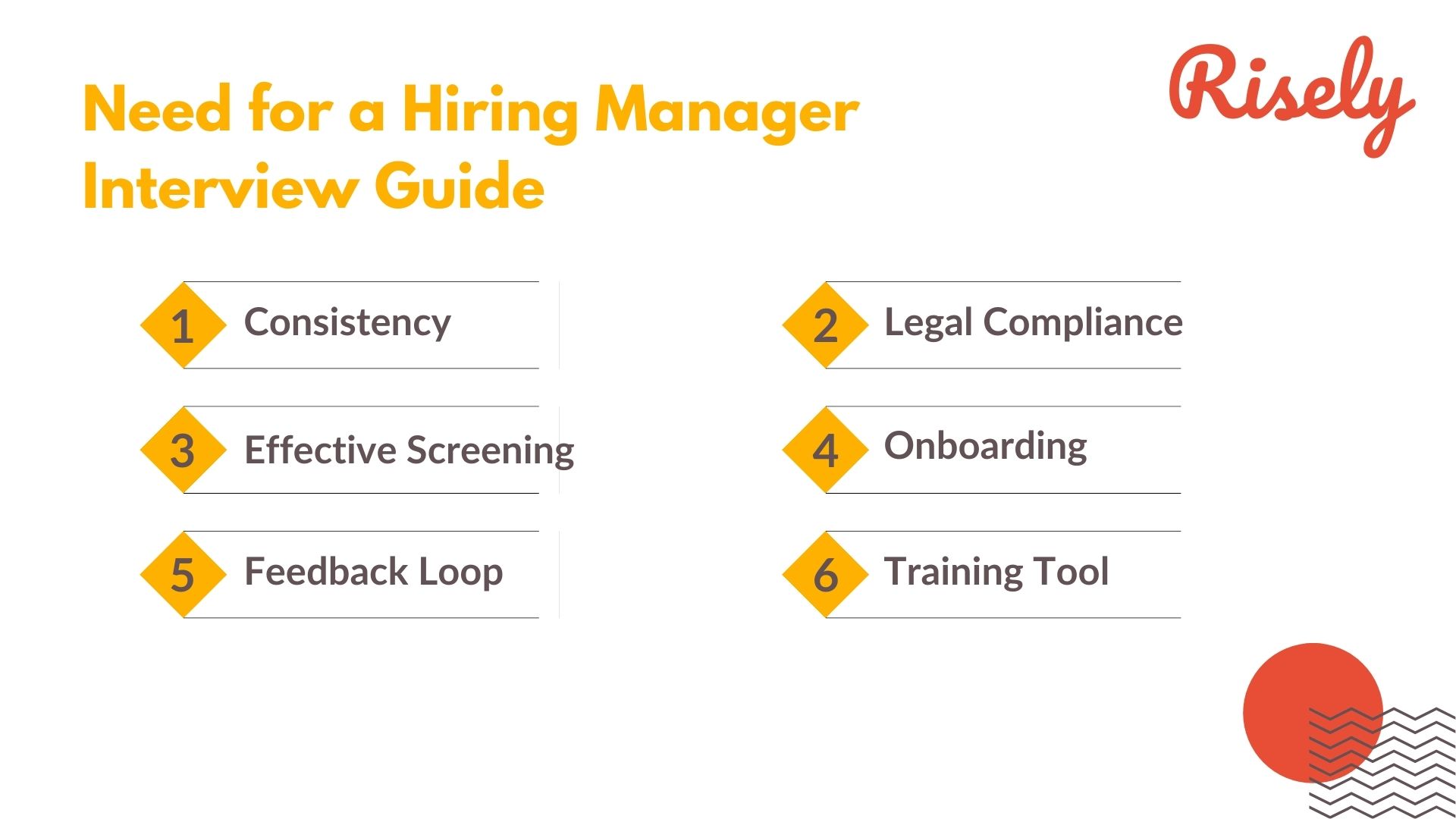Mastering the Art of Hiring: A Comprehensive Hiring Manager Interview Guide
Hiring the right talent is a cornerstone of an organization’s success. In today’s competitive job market, the role of a hiring manager is more critical than ever. Hiring managers need a structured and practical approach to identify the best candidates who will meet the job requirements and align with the company culture. That’s where a well-crafted hiring manager interview guide comes into play. This blog explores the art of hiring manager interview guide. We delve into the importance of having a comprehensive interview guide, the steps to create one, and tips to conduct interviews effectively. Whether you’re an experienced hiring manager looking to refine your approach or a newcomer to the hiring world, this guide will provide you with the insights and tools needed to make informed and strategic hiring decisions.What is the role of the hiring manager in an interview?
The hiring manager plays a pivotal role in the interview process, where they are responsible for several key tasks:- Defining job requirements: The hiring manager first determines the qualifications, skills, and experience required for the open position. This involves creating or updating the job description and specifying the candidate evaluation criteria.
- Screening resumes and applications: Hiring managers review resumes and job applications to shortlist candidates who meet the basic job requirements. They identify candidates whose backgrounds align with the position’s needs.
- Developing interview questions: Crafting interview questions that assess a candidate’s qualifications and fit for the role is another key responsibility. The hiring manager may also collaborate with the HR team or interview panel to create a comprehensive set of questions.
- Conducting interviews: The hiring manager typically leads or participates in candidate interviews. They ask questions, evaluate responses, and assess how healthy candidates match the job requirements. This involves in-person, phone, or video interviews.
- Assessing cultural fit: Hiring managers often evaluate whether candidates are a good cultural fit for the organization. They consider how well a candidate’s values, work style, and personality align with the company’s culture.
- Collaborating with the interview panel: In larger organizations, the hiring manager may work alongside an interview panel that includes team members, department heads, or HR professionals. They coordinate with the panel to ensure a comprehensive evaluation of candidates.

Need for a Hiring Manager Interview Guide
A hiring manager interview guide is an essential tool for several reasons:- Consistency: It ensures that all candidates are evaluated using the same criteria and questions, promoting fair and consistent assessments.
- Legal compliance: A well-structured guide helps hiring managers avoid asking illegal or discriminatory questions, reducing legal risks.
- Effective screening: It helps hiring managers focus on critical aspects of the job and candidate qualifications, improving the efficiency of the screening process.
- Improved decision-making: An interview guide ensures hiring managers cover all relevant topics, leading to more informed and confident hiring decisions.
- Structured assessments: The guide helps hiring managers rate and compare candidates objectively, reducing the impact of biases.
- Candidate experience: A structured interview can create a positive candidate experience, enhancing the company’s reputation.
- Onboarding: An interview guide can help hiring managers identify the best candidates for onboarding, leading to higher retention and better performance.
- Feedback loop: It encourages hiring managers to provide feedback and share insights with HR and other team members, leading to continuous improvement in the hiring process.
- Training tool: It is for new hiring managers, helping them understand the organization’s expectations and best practices.
How to create a hiring manager interview guide?
Creating a hiring manager interview guide involves several steps to ensure the directory is well-structured and effective. A step-by-step process to make a comprehensive hiring manager interview guide:- Understand the job requirements: Start by thoroughly understanding the job requirements and the skills, qualifications, and attributes needed for success in the role.
- Identify key competencies: Identify the essential competencies and qualifications for the job. This might include technical skills, soft skills, experience, and cultural fit.
- Develop a list of standard questions: Create a list that addresses the key competencies. These questions should be open-ended and designed to elicit detailed responses from candidates.
- Behavioral and scenario-based questions: Incorporate behavioral questions and scenario-based questions to assess how candidates have handled relevant situations in the past.
- Legal and ethical considerations: Ensure all questions are legal and ethical, avoiding topics like age, gender, religion, or other protected characteristics.
- Rating system: Develop a rating system or scoring criteria to assess candidates’ responses. This system should align with the competencies and qualifications identified earlier.
- Guidelines for follow-up questions: Provide guidelines for when and how to probe further or ask follow-up questions to get more detailed candidate responses.
- Explanation for each question: Include explanations in the guide, detailing why the question is relevant and what you are looking for in the candidate’s response.
- Sample answers: Provide sample answers or indicators of what constitutes a strong response for each question. This helps hiring managers evaluate candidates effectively.
- Scoring sheet: Create a scoring sheet or evaluation form that hiring managers can use to rate candidates’ responses during the interview.
- Training and explanation: Provide training and explanation to hiring managers on how to use the guide effectively. Offer examples and scenarios to clarify the expectations.
How can a hiring manager prepare for an interview?
Hiring managers can prepare for interviews effectively by following these steps:- Review the job description: Familiarize yourself with the job description, including the qualifications, skills, and experience required for the role.
- Understand the company and culture: Ensure you have a strong understanding of the company’s mission, values, culture, and goals. This knowledge will help you assess a candidate’s potential cultural fit.
- Study the candidate’s resume: Carefully review the candidate’s resume to understand their background, work history, and accomplishments.
- Develop interview questions: Create a set of interview questions that align with the job requirements and competencies. Include a mix of standard, behavioral, and scenario-based questions.
- Standardized rating system: Establish a standardized rating system or evaluation criteria to assess candidates consistently. This system should align with the competencies and qualifications required for the job.
- Sample answers and indicators: Include sample answers or indicators of what constitutes a strong response for each question in your interview guide. This will help you evaluate candidates effectively.
- Probing and follow-up guidelines: Develop guidelines for when and how to probe further or ask follow-up questions to gain deeper insights into candidates’ responses.
- Prepare for a positive candidate experience: Plan the interview logistics, such as the location and timing, to ensure candidates have a positive experience.
- Active listening: Practice active listening during interviews to ensure you fully understand candidates’ responses.
- Feedback and follow-up: Plan for timely feedback to candidates and colleagues involved in the interview process. Offer constructive feedback where appropriate.
Other Interesting Reads
Tips for hiring managers to conduct an interview effectively
An effective interview is crucial for hiring managers to identify the right candidate for a job. Here are some tips to help hiring managers conduct interviews effectively:- Review the candidate’s resume, the job description, and any relevant materials before the interview.
- Ensure that the interview space is comfortable, well-lit, and free from distractions.
- Start the interview with a friendly greeting to help candidates feel at ease. Building rapport can lead to more candid responses.
- Use open-ended questions to encourage candidates to provide detailed responses. Avoid yes/no questions.
- Pay close attention to the candidate’s responses. Active listening demonstrates your interest and allows you to gather valuable information.
- Record important points during the interview. This will help you remember details and make comparisons between candidates.
- Keep the interview on schedule and ensure that you cover all planned questions and topics.
- Use the same questions and evaluation criteria for all candidates to ensure a fair and objective evaluation.
- Be mindful of unconscious biases. Avoid making assumptions about candidates based on factors unrelated to the job.
Conclusion
In the world of recruitment, hiring managers play a pivotal role. They are the gatekeepers of talent, entrusted with identifying the right individuals to drive an organization forward. The process of interviewing candidates, however, can be complex and challenging. That’s where a well-structured hiring manager interview guide comes into play. As we conclude this exploration of the hiring manager interview guide, it’s evident that having a comprehensive and thoughtful approach to interviews is a game-changer. A practical interview guide ensures consistency, fairness, and objectivity throughout the hiring process. It empowers hiring managers to make informed decisions that align with the company’s needs and culture.Ace performance reviews with strong feedback skills.
Master the art of constructive feedback by reviewing your skills with a free assessment now.
Other Related Blogs
How to Set Effective Learning and Development Goals?
This blog highlights how effective learning and development goals are set, why is setting them important for your organization and what challenges you might face during this process. … Read…
Are you on track to meet your Q1 goals?
Are you on track to meet your Q1 goals? We are in the middle of the first quarter of 2024. Seems hard to believe. It surely is! ⏰ Time has…
5 Secrets Of Solid Goal Setting At Work You Can’t Miss
5 Secrets Of Solid Goal Setting At Work You Can’t Miss “I don’t focus on what I’m up against. I focus on my goals and I try to ignore the…
Understanding the world of Goal Setting Coach to reach new heights
Understanding the world of Goal Setting Coach to reach new heights Setting and achieving goals is essential for personal and organizational success in today’s fast-paced and competitive work environment. However,…


